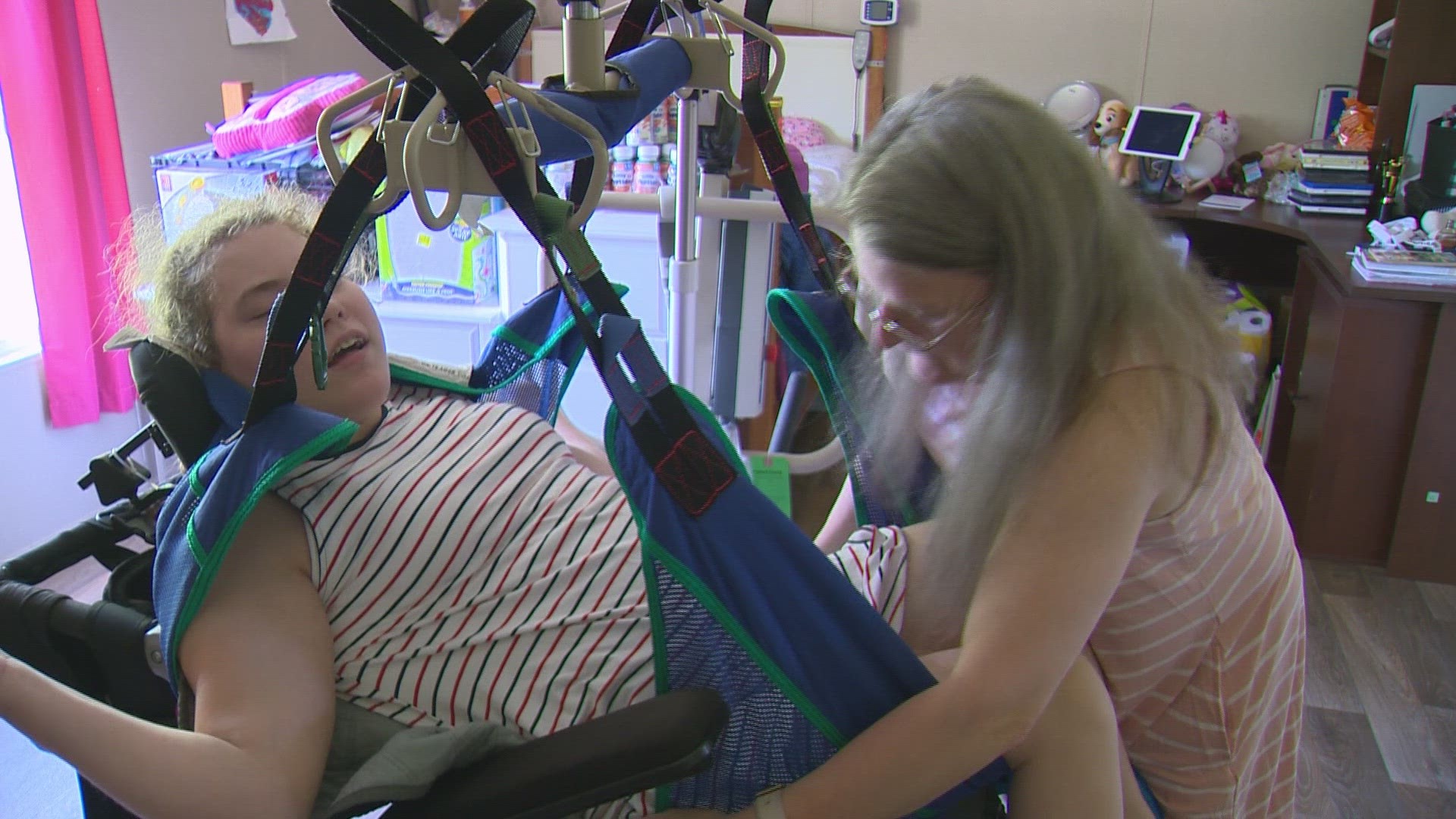AUSTIN, Texas — Tens of thousands of Texans, some sick and disabled enough to be in a nursing home or state institutions, are going years without proper care as they await state approval for covering health services in their own home.
The long delays are the result of what advocates say is a badly broken system in Texas, which the KVUE Defenders found has a years-long wait list for those needing life-sustaining services.
Will lawmakers fix the system? Families like the Crawford’s in northeast Texas hope so.
Inside the Crawford family home in Paris, Texas, there are many rituals necessary to help Kimberly Crawford get through every day. She requires help just getting out of bed before her therapies begin. It’s much needed help that comes to 21-year-old Kimberly through a state-funded program called the Medicaid waiver system.
Kimberly’s parents adopted her in Louisiana at age 3. She was born at 24 weeks with seven drugs in her system and multiple disabilities, including cerebral palsy. Her mother, Elena Crawford says she needs help doing practically everything.
“Training her on how to eat. Helping her with being able to manipulate her body to the best of her ability,” Crawford explained. “If those things had not been in place, you’d be looking at a very different child sitting here…completely, if sitting here at all.”
State officials developed the waiver system that brings home-based care to people like Kimberly in the 1980s as nursing home costs were soaring for the state. The goal was to save the state money and give patients as much independence as possible in their own homes and communities.
Crawford and her husband moved back to their hometown of Paris 10 years ago.
“When we got here, they started telling me about waivers,” said Crawford. “Of course, I was like, ‘What is a waiver? Why do I need it? What will it do?’”
The state has six different waivers for a person to possibly receive state-funded care at home. Once a person finally gets off the waitlist, they receive services such as speech therapy, occupational therapy and other in-home personal care like help with bathing along with necessary improvements to their home to make it safer to live.
But here’s the problem: There are now a combined 170,000 people waiting on the list and in some cases it can take more than a decade to get to the top of the list and finally get help. While they wait, families often have to admit a loved one into a facility, burn through their own money for care, or in some cases, suffer without care.
Kimberly gets services through a waiver for medically dependent children. But those waiver services end when she turns 21. She’s on the waitlist and years away from making it to the top of the list for other waiver services for adults.
"I fear for her life. Absolutely," Crawford told KVUE’s Tony Plohetski. "Basically at 21, without a waiver program, my daughter becomes a nobody in the eyes of the state.”
Dennis Borel, executive director for the Coalition of Texans with Disabilities, says advocates have pressed for years for the state to dramatically overhaul the system.
“It’s been neglected for years, and it has just gotten bigger and bigger and bigger,” said Borel.
Borel says a properly funded and functioning system will ultimately save the state money.
“People that get reliable services or community services of any services stay healthier. They have less decline. So they have less acute care costs, less trips to the emergency rooms, less hospitalizations, less unnecessary institutionalization,” Borel said.
State Rep. James Frank, who chairs the House Human Services Committee, agrees Texas’ system for home-based services is broken. He says part of the problem is the state lacks an accurate picture of who needs services and what services they need. The state does not screen people seeking aid until they get to the top of the list rather than when they first apply.
"One of the things we are trying to do is get a better handle on, 'what is the true waitlist?" Frank said. "There is some underfunding, but most of it is overcounting."
Still, the state has only granted only a few hundred new waiver slots in recent years, even as the number of people seeking services has grown. Officials from the Texas Department of Health and Human Services say that as lawmakers sort through the operations of the program, they are doing what they can to ease the wait, including possibly directing patients to other available care.
No bill has been filed to substantially reform the system during the 2023 Legislative session. The deadline is Friday. However, lawmakers are discussing adding as many as 2,000 new positions during the next two years to the system, potentially allowing more people to receive services.
Crawford says she feels the state is failing people like her family and most especially, Kimberly.
"I feel like as a Texan, Texans take care of each other, and they have missed the mark on this," said Crawford. "I'm not saying that the state of Texas isn't trying. I'm just saying that what they are doing right now isn't successful, so we have to try to find something that is."
Kimberly reaches her 21st birthday in August. Her parent's panic is growing about the possible loss of services. But they insist they will continue to do all they can to care for her at home themselves.

